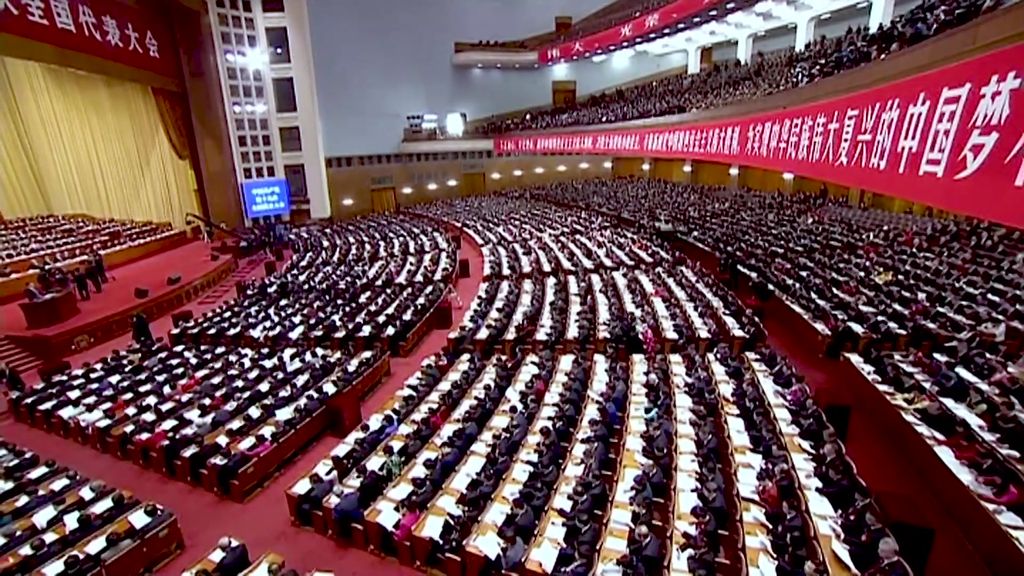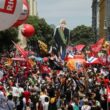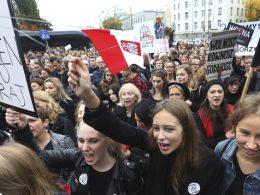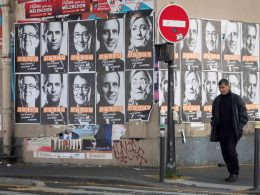By Vincent Kolo, chinaworker.info
It was never in doubt that at October’s five-yearly CCP Congress Xi Jinping would be crowned de facto Emperor. He now starts a third-term as CCP general secretary and commander-in-chief of the army, which can be extended indefinitely as long as Xi himself is the one who decides. At the National People’s Congress (NPC) in March he will be confirmed again as president, a less important position. Aside from rubber-stamping the extension of his rule, the 20th CCP Congress was a giant stage to project Xi’s unrivalled grip on state power.
The “most powerful leader since Mao” was the intended theme, repeated in almost all global media coverage. Not really, is our reply. Xi’s hold over the CCP machinery and purge of potential rivals is indeed unprecedented. But how much real additional power this grants the dictator is an open question given the titanic scale of the crisis facing China today.
The economy has entered a Japanese phase of slow growth weighed down by the deflationary collapse of financial bubbles. Goldman Sachs estimates next year’s GDP will be a whole $2 trillion lower than the regime’s projections from January this year. The now abandoned 5.5% GDP target from the March NPC was the lowest target for three decades, but will be remembered as hopelessly unrealistic.
Multiple crises
The property crisis that began in mid-2021 shows no signs of bottoming out. An estimated 7 billion square meters of residential property are under construction and unsold. That measures up against 1.76 billion square meters sold in the peak year 2020, before the crash. At the same time marriages — with a clear connection to house sales — have plummeted from 13.5 million when Xi came to power, to 7.6 million last year. Economist Andy Xie says “if every marriage leads to a property purchase and the number of marriages doesn’t fall further, it would still take about 10 years to digest the inventory.” (South China Morning Post, 22 September).
Three years of Zero Covid have trapped society and the economy in a real-life version of ‘Groundhog Day’, an ever-repeating loop. Since the congress, lockdowns have spread to 28 cities and currently affect 207 million people. Urumqi, the capital of strife-torn Xinjiang, has been in lockdown since August. Censured reports from Xinjiang say that 13 people died from the effects of disinfectant sprayed in their homes by Covid enforcers (dabai). The death of 27 passengers in a bus accident in Guizhou triggered an online outcry. The passengers, part of a group of 3,000, were being forcibly transported from the capital Guiyang to a distant quarantine facility, on dangerous roads at two in the morning (!).
“We’re all on that bus” became a popular online protest slogan. Since the start of the pandemic in 2019, only two people have died of Covid in Guizhou province. After the CCP congress, a rare protest took place in the Tibetan capital Lhasa, significant also because those protesting the Covid restrictions were Han Chinese migrants not ethnic Tibetans.
Also after the congress, Foxconn’s largest factory in China at Zhengzhou, which employs 200,000, saw a mass breakout of migrant workers escaping lockdown. Videos shared online showed thousands trekking across wasteland carrying their bags and bedding from the factory, aiming to get back to their home villages. There are unconfirmed reports of paramilitary troops being sent to the Foxconn plant. Another mass escape was attempted by tourists at Shanghai’s Disneyland, which was placed under snap lockdown for the second time this year.
How does the power struggle waged inside the 20th Congress relate to the accumulation of suffering and discontent outside? Xi’s mission from the start, in 2012, was to “save the CCP”, to centralise power and to transition from authoritarian rule under a committee, to a form of one-man rule which owes more to China’s imperial era than to Maoism. Through increased repression and a digital surveillance state that has out-Orwelled Orwell, combined with militaristic nationalism and “Western threat” propaganda, Xi has tried to stare down the many social, economic, political and geopolitical crises that have arisen. But the next period will provide even more severe tests.
“Security” is number one
This was reflected in Xi’s almost two-hour long work report. The most important word he used was “security” which was mentioned 91 times, almost double the mentions from Xi’s speech of five years ago. This shows the CCP leader’s fears of social explosions at home as well as external threats. “Taiwan” was mentioned 12 times, a slight increase on 2017, and drew the loudest applause from the congress, but that is a Pavlovian reaction and doesn’t tell us so much about what Xi and his team are really planning. If anything, the tone of Xi’s speech was more cautious and less bombastic than five years ago. What this reveals is that, behind the rhetoric, his regime is feeling intense pressure from the Cold War, and the accelerating decoupling process which is exacerbating China’s economic downturn. Xi wants to try to de-escalate tensions with the Biden administration, to at least place some limits on the pace of escalation.
When the 20th Congress closed it became clear that the new 24-man Politburo and its seven-man Standing Committee (PSC) were stacked with Xi’s supporters. This is “Maximum Xi” proclaimed Foreign Policy magazine. Formerly powerful CCP factions like those led by ex-leaders Jiang Zemin (the ‘Shanghai gang’ or ‘Princeling faction’) and Hu Jintao (the ‘Communist Youth League faction’ a.k.a. tuanpai) that were already largely neutralised have now been completely eliminated from these two most important CCP organs.
Many commentators had expected Xi to make a concession to the tuanpai in particular, offering them a small role in the carve-up of top seats and, possibly, to retain their hold on the premier’s position. The current premier Li Keqiang who retires in March 2023 is from the tuanpai. Li and other leading tuanpai representatives profile themselves as the disciples of Deng Xiaoping’s reform policy (the term used for China’s capitalist restoration).
In the cryptic style that is the norm in CCP politics, Li Keqiang has aimed some muted criticisms at Xi’s policies, for example over the crippling application of the Zero-Covid policy and Xi’s completely delusional claim to have “eradicated poverty”.
The premier’s portfolio has however been downgraded in importance since the early years of Xi’s reign. Traditionally with overall control of China’s economic policy, this has only been very partially the case in recent years. The same could also be said of the Politburo and PSC, which have faded in importance as Xi’s expanding “core” role crowds out everything else. Therefore, the speculation about the next premier and the possibility of minor concessions to rival factions would only have had a symbolic character and not fundamentally affected the political direction of Xi’s rule.
Compromise?
Rumours before the 20th Congress suggested Xi had perhaps struck a limited deal with the tuanpai faction, to throw them a bone, within the context of the further consolidation of his grip on power. The logic for any such compromise was not that Xi needed this or that his position is at this stage under threat from the CCP’s continuing power struggle. This is despite the fact that in the real world, Xi’s position has undoubtedly been weakened due to the dire economic situation and Cold War setbacks. But his strength within the organs of the CCP-state shows that the interests of the capitalist system as a whole require an even more rigidly authoritarian regime.
As we have pointed out the anti-Xi factions lack strength, just as they lack any coherent alternative policy. Their “opposition” is more a mood of alarm over the ruinous direction of the economy especially. They see China heading towards increasing international isolation and economic setbacks. The logic for Xi to make any concessions to these forces would therefore only have been to offer some reassurance to the financial markets and private sector capitalists that he was prepared to adjust some of his nationalist policies which have cost the capitalists huge sums of money.
According to this discourse the tuanpai are regarded as economic “moderates”, more committed than Xi to continuing Deng’s economic reforms, which offer greater advantages to the private sector. Capitalist commentators were therefore anxious for signs from the 20th Congress that Xi would allow some checks and balances, if only very slight ones, as he began his lifetime rule project. This was not the case. In the end, Xi opted for a clean sweep of the Politburo and PSC with not even a single seat left to the “opposition”. Xi’s need to demonstrate his power, to show no quarter towards his internal critics, outweighed the rationale for concessions to appease the market.
Stock market rout
On Monday 24 October, the day after Xi led the six other members of the new PSC onto the stage to present them, the stock markets tanked. The ten biggest US-listed Chinese companies, including Alibaba and Pinduoduo, lost $68 billion in a day. These ten firms were valued at $1.6 trillion in February 2021, but now stand at $401 billion. It’s hard not to laugh when we read that Alibaba’s Jack Ma lost $900 million during that one day.
For the Hong Kong stock market, this was its worst day since the 2008 crisis, with a drop of 6.4%e days following the congress, Hong Kong’s index for mainland companies suffered its worst result ever. The yuan slid even further against the dollar as financial speculators sold the Chinese currency, which has fallen 17% since the start of the year.
It didn’t help that the government chose this day to publish its quarterly GDP results, having mysteriously postponed their release during the week of the congress. The delay increased suspicions that Beijing was again cooking its books. Th%e reported GDP growth of 3.9% for the July-September quarter (compared to 0.4% in April-June), while considerably short of the official 5.5% target, still looks inflated.
Stock market turmoil has continued, with China’s main CSI 300 Index now down 35 since January, adjusted for currency volatility. Measured in dollars the CSI 300 is down 51%. No surprises then that the capitalists inside and outside China are despondent over the outcome of the congress.
Thomas Gatley of Gavekal Dragonomics in Beijing summed it up this way: “Investors were imagining a scenario where Xi basically got his own way, but there would still be some adults in the room with some kind of pro-market pushback. Now there won’t be anyone in the room saying, ‘we need to pull back a little bit’. If everyone there is just nodding their heads, there’s nothing to stop share prices falling as far as they can.”
Of course, for working class people and the oppressed masses there are very different implications from the 20th Congress. Let the capitalists weep over the stock market. The composition of the new PSC, full of Xi’s ‘yes men’, signifies he is doubling down on key policies such as Zero-Covid, with its unprecedented level of social control and digitally enhanced repression. In numerous but typically cryptic ways, the congress signalled the Zero-Covid policy will continue through 2023 and perhaps longer.
Three articles penned by Zhong Yin, believed to be a code name for the regime, said the country had to continue the Zero Covid strategy, adding that only if the epidemic was under control would the economy be stabilized. During the congress it was announced that China now has the capacity to conduct one billion PCR tests every day. Shanghai, where a two-month lockdown in the spring caused massive discontent, has begun recruiting 1,000 new test-and-trace operatives on two-year contracts — hardly a sign of an imminent change of policy.
Purges and promotions
In fact, the Zero-Covid policy is also a political tool used by Xi Jinping in the power struggle before the congress. Those who slavishly followed the policy have been promoted while those who procrastinated have been purged. Chief among those promoted to the PSC is Shanghai’s former CCP boss Li Qiang.
Li became a detested figure during the city’s epic lockdown, with multiple scandals revealing mismanagement, inefficiency and of course brutality. But as a loyalist and member of Xi’s ‘Zhijiang New Army’ (the name of Xi’s faction, formed mostly from those who previously served with him in the provinces of Zhejiang and Fujian) who brutally stood the course on Zero Covid, Li has been rewarded with the number two spot in the regime and is tipped to become premier next March. Also promoted to the PSC were the CCP leaders of Beijing and Guangdong province, Cai Qi and Li Xi. Like Li Qiang, they are regarded as trusted members of Xi’s faction.
The incident that generated the biggest reaction from ordinary people however was the sensational removal of Xi’s predecessor, the former CCP leader Hu Jintao, from the congress stage on the final day. The aged leader who is evidently in poor health seemed to resist being moved and was “helped” out of his seat by two security officials.
This has triggered a great deal of speculation. Was Hu in some way expressing dissent with the final list of names presented for the Politburo and PSC? A theory is doing the rounds that Hu had only at that moment discovered that his tuanpai protégé “Little Hu” Hu Chunhua had been demoted from both the PSC and the Politburo. Prior to the congress, Hu Chunhua, who is still relatively young at 59, was tipped as a possible candidate for premier by some media. Now we know that’s not going to happen.
Or did Xi use this incident to deliberately publicly humiliate Hu, the figurehead (now surely retired) of the rival tuanpai faction? We may never know the truth, but that is less important than the backlash this incident has generated, especially among young people. There is a feeling that it was a deliberate act, that Xi did this to demonstrate his total power over the CCP and society. The crises that are deepening outside the Great Hall of the People will not be so easily eliminated.












